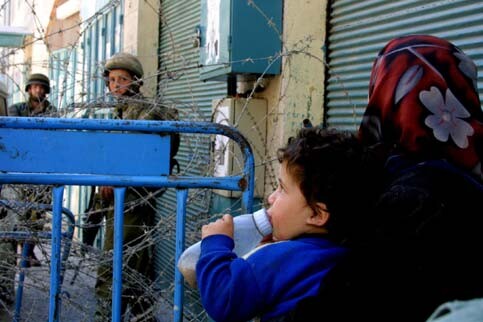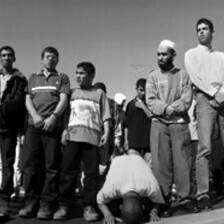
Bethlehem, April 2002. (Musa Al-Shaer)
“We should keep off the lights of the Christmas tree,” says Mary after her return from France. Due to the occurrence of three consecutive Christmas feasts in Bethlehem - on 25 December, January 7 (Orthodox) and January 19 (Armenian) - we keep the Christmas tree longer than probably anywhere else in the world. The tree is of course a great attraction for Jara and especially Tamer, who points his finger to the lights, and exclaims “daw, daw” [light, light]. But our cousin, in whose shop Tamer used to get his Christmas presents, died of cancer at a very young age, in her thirties.
Mary cries, for her it is once again evidence how unfair the world is. It is in fact remarkable how many have passed away during these three years of Intifada because of illnesses not related to politics, at least not directly. I should check out with the medical services in town to look at the precise causes. When we attend the customary memorial occasion forty days after the cousin’s decease, we join two human circles in the Antoniana reception hall, one for men, the other for women. The women of the closest family wear black clothes; they do so for sometimes more than a year.
At the teacher workshop about diary writing the participants say that nowadays Palestinians here are less strict in observing customs like not holding, for a period of up to one year, a wedding party after somebody in the family has passed away. In the past it was unthinkable not to comply but the negative events are so frequent and overwhelming these days that it is simply too unpractical to let one’s social life be prescribed by them. As Mary says, one has to live. When some of the St Joseph girls are invited to talk about their diaries, they say that they, too, do not want themselves to be overly effected by the death and destruction around them.
At school they have somehow learned to turn their emotional button off, and in a way forget about what is happening in the world around them (although never quite) so that they can concentrate on the matters at hand. How can you study, when you all the time have to worry about your family, your future, the Wall? After all, you have to get your exams, your diplomas. But the diary writing sessions at school, says Suzy, bring back the problems thus repressed. It happened not just one time that the whole class was crying when one of the girls relayed a particularly tragic occasion, such as when a deceased father could not be buried in Bethlehem because he had a Jerusalem ID while most family could not attend the funeral because they could not get the relevant permit to travel to Jerusalem. Suzy herself cried too, in front of the class. Afterwards, she encouraged the students to look at how they can also try to overcome such moments of depression by thinking about positive happenings and actions. Life goes on.
When during the workshop some of the students show scenes of theater they made from each other’s diaries (with the help of ‘Inad theater in Beit Jala), they can barely hide their enthusiasm in showing their talents even though the subjects are heartbreaking, like how a St Joseph school student, Christine, was shot dead by the Israeli army in search of wanted men and who targeted the wrong family in a shooting spree in the heart of Bethlehem last year. A student demonstrates the killing by falling down flat in front of the class (one of her schoolmates is Christine’ sister). Afterwards she tells that she sees herself becoming a theater director. “Sweet sixteen,” some of the diarists call themselves but they wonder what is sweet about their life.
Jara suddenly cries bitter tears when I tell her that all people, and she too, once die. “Isn’t it, mama, that after death we go to heaven,” she asks. When Mary answers in the affirmative, Jara asks how it is at all possible that when you are dead and you thus cannot move you go to heaven. Mary warns me that Jara is now sensitive about the subject of dying and that it is better not to present reality too crudely and directly. In fact I see that Jara lately prefers to hear warm and comfortable stories about friendly animals and well-doing fairies instead of the multiple killings so common in many fairy tales. A few days ago she asked me why she suddenly heard a loud boom and our windows were trembling. It was because at about a kilometer distance, in ‘Aida camp, the house was blown up of the family of the man responsible for the killing of ten Israelis and injuring of many more civilians in Jerusalem, in a suicide mission.

30 January 2004. Israel blows up the Aida refugee camp home of Ali Jaara, 24, a Palestinian police officer who carried out a suicide bomb attack in Jerusalem the day before which ultimately claimed 11 lives and injured 50. 13 people lived in the two-story stone structure. Jaara had not told his family of his intentions. The Associated Press reported that: the bomber’s distraught parents said he was a quiet and devout Muslim who showed little interest in politics. Jaara left a note saying he was avenging those killed in Gaza a day before. Jaara’s father, Munir, said his son was the only breadwinner in a family of 11, and had been hoping to start a family. “I was expecting to marry him, not to bury him,” the father said. Jaara’s mother sat on a mattress on the floor, crying. She carried a picture of her son in a police uniform with his police-issue assault rifle. The Palestinian attacks are “really bad for us. They only hurt us,” said his 26-year-old sister, Ola. (Photo: Musa Al-Shaer)
I tell Jara I will return to the subject later. There are different opinions here about such cruel killings. I think most people in Bethlehem ask why there is an international outcry on the subject of the suicide missions but the nine killings in Gaza the day before are left largely unnoticed. A problem I see coming up is that with so many killings around you, your own sensitivity declines, at least if they don’t affect your closest circle. Our neighbour who repairs things in our house says that he can’t see the meaning of the violence nor from the side of the Palestinians nor the Israelis. “It’s a march of folly, nothing has really changed compared to the beginning of the Intifada.”
Today, during the Moslem Al-Adha feast I can reassure Jara that the shooting she hears outside is not from the Israeli soldiers, as she thinks, but from children using firework. Mary tells me that in our deceased cousin’s toy shop, many families and children bought pistols and tanks as presents during the feast. Mary is neither surprised nor shocked. “It’s their life, they can’t see much else.”
These days Tamer is totally preoccupied with two things: airplanes and everything that turns around. “Funaane,” (from furaane = top, or draaitol, in Dutch) he says when he has once again discovered something which he can turn around. The family showers him with plastic airplanes and round or swinging objects. Our neighbour, influenced by his habit, has herself started turning little things on her desk at work.
Yes, we need a little distraction from the cruel life. At breakfast, Mary has decided not to take sausage anymore but to keep the much better peasant custom of the land: dipping the pitta bread in a heavy sweet syrop made of grapes (dibbis) and the somewhat dry and slightly bitter zeit w za’ater (oil and thyme). Afterwards we do our family ritual and say invitingly habibi, habibi [my love, my love] to Jara and Tamer who join us in a small circle of warm embrace.
Toine van Teeffelen is a Dutch national, married to a Palestinian, and is a local coordinator of the United Civilians for Peace, a Dutch initiative to send civilian monitors to the West Bank and Gaza Strip.





